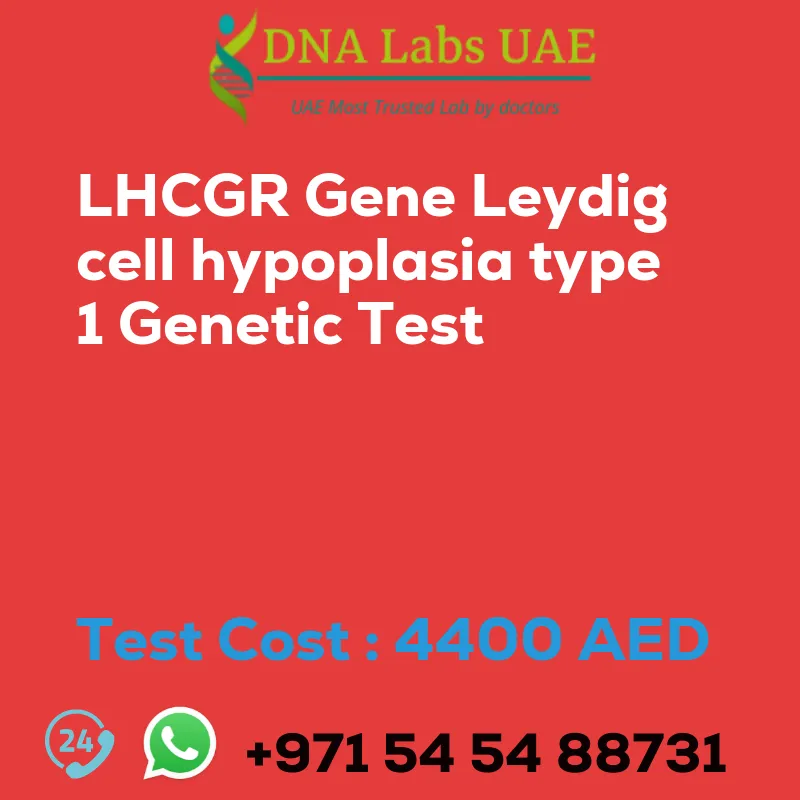LHCGR Gene Leydig cell hypoplasia type 1 Genetic Test
Cost: AED 4400.0
Test Details:
Leydig cell hypoplasia type 1 (LCH1) is a rare genetic disorder that affects the development and function of Leydig cells in the testes. This condition is caused by mutations in the LHCGR gene, which provides instructions for making the luteinizing hormone/choriogonadotropin receptor.
Components:
- Price: AED 4400.0
- Sample Condition: Blood or Extracted DNA or One drop Blood on FTA Card
- Report Delivery: 3 to 4 Weeks
- Method: NGS Technology
- Test Type: Reproductive Disorders
- Doctor: Gynecology
- Test Department: Genetics
- Pre Test Information: Clinical History of Patient who is going for LHCGR Gene Leydig cell hypoplasia type 1 NGS Genetic DNA Test. A Genetic Counselling session to draw a pedigree chart of family members affected with LHCGR Gene Leydig cell hypoplasia type 1 NGS Genetic DNA Test gene LHCGR
Test Process:
In the context of Leydig cell hypoplasia type 1, an NGS genetic test can be used to identify mutations or variations in the LHCGR gene that may be responsible for the condition. The NGS genetic test for LCH1 involves obtaining a DNA sample, typically through a blood or saliva sample, from the individual undergoing testing. The DNA is then sequenced using NGS technology, which allows for the identification of specific variations or mutations in the LHCGR gene. The results of the test can help confirm a diagnosis of Leydig cell hypoplasia type 1 and provide valuable information for genetic counseling and management of the condition.
It is important to note that genetic testing should be performed and interpreted by qualified healthcare professionals who specialize in genetics, as they can provide appropriate guidance and support based on the test results.
| Test Name | LHCGR Gene Leydig cell hypoplasia type 1 Genetic Test |
|---|---|
| Components | |
| Price | 4400.0 AED |
| Sample Condition | Blood or Extracted DNA or One drop Blood on FTA Card |
| Report Delivery | 3 to 4 Weeks |
| Method | NGS Technology |
| Test type | Reproductive Disorders |
| Doctor | Gynecology |
| Test Department: | Genetics |
| Pre Test Information | Clinical History of Patient who is going for LHCGR Gene Leydig cell hypoplasia type 1 NGS Genetic DNA Test. A Genetic Counselling session to draw a pedigree chart of family members affected with LHCGR Gene Leydig cell hypoplasia type 1 NGS Genetic DNA Test gene LHCGR |
| Test Details | Leydig cell hypoplasia type 1 (LCH1) is a rare genetic disorder that affects the development and function of Leydig cells in the testes. This condition is caused by mutations in the LHCGR gene, which provides instructions for making the luteinizing hormone/choriogonadotropin receptor. NGS (Next-Generation Sequencing) genetic testing is a type of genetic test that uses advanced sequencing technologies to analyze multiple genes simultaneously. In the context of Leydig cell hypoplasia type 1, an NGS genetic test can be used to identify mutations or variations in the LHCGR gene that may be responsible for the condition. The NGS genetic test for LCH1 involves obtaining a DNA sample, typically through a blood or saliva sample, from the individual undergoing testing. The DNA is then sequenced using NGS technology, which allows for the identification of specific variations or mutations in the LHCGR gene. The results of the test can help confirm a diagnosis of Leydig cell hypoplasia type 1 and provide valuable information for genetic counseling and management of the condition. It is important to note that genetic testing should be performed and interpreted by qualified healthcare professionals who specialize in genetics, as they can provide appropriate guidance and support based on the test results. |







